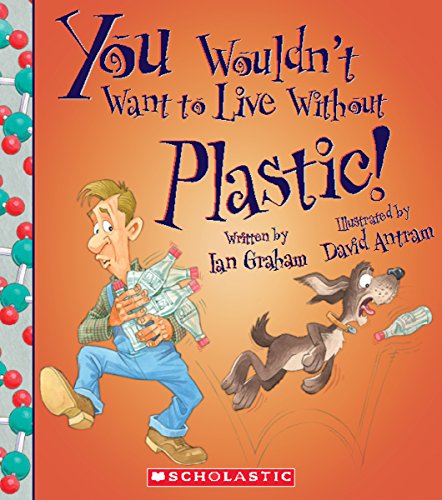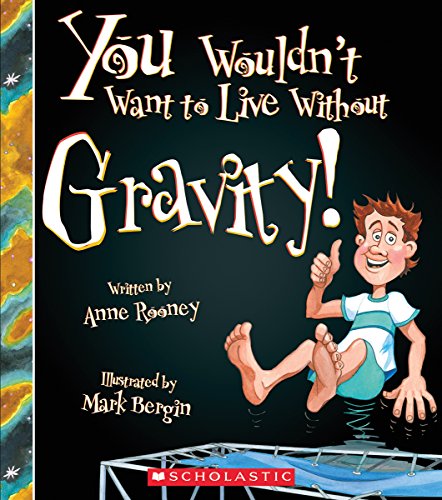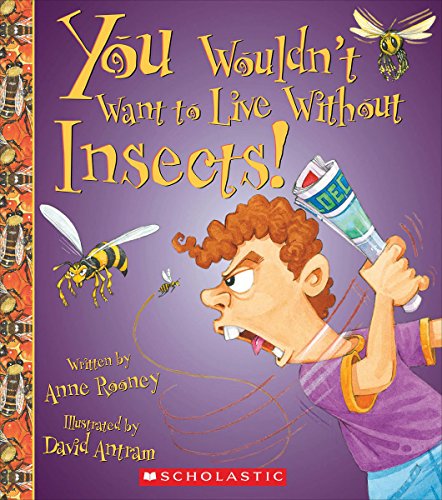-
You Wouldn't Want to Be an Inca Mummy!
Colin Hynson, David Antram
Paperback (Franklin Watts, Sept. 1, 2007)This interactive series will enthrall young and reluctant readers (Ages 8-12) by making them part of the story.Invites readers to become the main character. Each book uses humorous illustrations to depict the sometimes dark and horrific side of life during important eras in history. R
R
-
You Wouldn't Want to Be Cursed by King Tut!
Jacqueline Morley, David Antram
Library Binding (Franklin Watts, Feb. 15, 2012)This lively, interactive series will enthrall young and reluctant readers by making them part of the story, inviting them to become the main character and revel in the gory, dark, horrific side of life during important eras in history. R
R
-
You Wouldn't Want To Live Without Toilets
Fiona MacDonald, David Antram
Library Binding (Turtleback, Sept. 1, 2014)FOR USE IN SCHOOLS AND LIBRARIES ONLY. Uses humor in both text and illustrations to describe what it would be like to live without the toilet and describes how people managed to dispose of their waste in the past. R
R
-
You Wouldn't Want to Live Without Plastic!
Ian Graham, David Antram
Library Binding (Franklin Watts, Sept. 1, 2015)What if plastic was never created?It can come in any color of the rainbow, be smooth and glossy, or dull and rough-but how important is this seemingly indestructible material, and would you want to live without it? If you were to go around your room and start listing all the things made of plastic, that list would soon become very long. Plastic is in your computer, mobile phone, television, pens and even in the clothes you wear. In this new You Wouldn't Want to Live Without title, find out about what plastics are made from, who invented some of the first plastics-and try your hand at making your very own plastic! S
S
-
You Wouldn't Want to Live Without Gravity!
Anne Rooney, Mark Bergin
Library Binding (Franklin Watts, Jan. 15, 2016)You don't really get a choice about gravity. If you live on Earth, you're going to have to live with it.This series takes readers (Ages 8-12) on a historical journey, examining how people coped in the past and how they developed ingenious ways to make life safer and less unpleasant. Each book features full-color cartoon-style illustrations and hilarious speech bubbles to heighten interest, making the series attractive even to reluctant readers.If you become an astronaut, you might get to escape from gravity for a while, but it will be waiting for you when you get home. But gravity does a lot of useful things - such as keeping us on the Earth and holding the entire universe together! Learn how gravity was discovered and why it helps us to understand everything from how toothpaste comes out of the tube to the movements of the planets. S
S
-
You Wouldn't Want to Live Without Trees!
Jim Pipe, Mark Bergin
Library Binding (Franklin Watts, Sept. 1, 2016)A world without trees would be a barren, dry and polluted wasteland.This series takes readers (Ages 8-12) on a historical journey, examining how people coped in the past and how they developed ingenious ways to make life safer and less unpleasant. Each book features full-color cartoon-style illustrations and hilarious speech bubbles to heighten interest, making the series attractive even to reluctant readers.Trees are among nature's most remarkable achievements, growing from a seed you can hold in your hand into a green giant several stories high. They are rugged survivors. They can live in baking hot deserts or icy arctic regions, competing with other plants for water and nutrients, while fending off cold, heat, drought, flood, poisons, parasites and predators. Trees can live for hundreds and even thousands of years, and teem with hundreds of different species of animal. At the same time, they provide us with fuel, food and shelter -?and even the oxygen that we breathe. W
W
-
You Wouldn't Want to Live Without Dirt!
Ian Graham, Mark Bergin
Library Binding (Franklin Watts, Jan. 15, 2016)What if we didn't have any dirt or soil? It's hard to imagine.This series takes readers (Ages 8-12) on a historical journey, examining how people coped in the past and how they developed ingenious ways to make life safer and less unpleasant. Each book features full-color cartoon-style illustrations and hilarious speech bubbles to heighten interest, making the series attractive even to reluctant readers.The ground would look different and many of the plants, trees and animals we know today would disappear. Dirt, and or soil, supplies a surprising variety of raw materials for making things. Learn about the ways dirt and soil have been used by humans over the centuries, from cave paintings to crop farming, and the exciting prospects for dirt and soil we may see in the future. S
S
-
You Wouldn't Want to Live Without Satellites!
Ian Graham, Mark Bergin
Library Binding (Franklin Watts, Sept. 1, 2018)This series takes readers (Ages 8-12) on a historical journey, examining how people coped in the past and how they developed ingenious ways to make life safer and less unpleasant.Each book features full-color cartoon-style illustrations and hilarious speech bubbles to heighten interest, making the series attractive even to reluctant readers.A satellite is a small object traveling around something bigger. The Moon is a natural satellite of Earth. A spacecraft launched into orbit around Earth is an artificial satellite. Since Sputnik-1, about 6,000 more satellites have been launched by 40 countries. Nearly 4,000 are still in orbit, and about 1,000 of them are still working. Learn about how we use satellites every day without knowing it to talk on the telephone, watch television, use the internet, predict the weather, navigate the landscape, and run businesses. W
W
-
You Wouldn't Want to Live Without Soil!
Professor of Cardiovascular Medicine Ian Graham
Paperback (Salariya Book Company Ltd, Jan. 7, 2016)Soil supplies a surprising variety of materials for making things. If soil didn't exist, life would have developed differently on Earth and humans probably wouldn't be here. You Wouldn't Want to Live Without Soil! is part of a brand-new science and technology strand within the internationally acclaimed You Wouldn't Want to Be series. T
T
-
You Wouldn't Want to Sail with Christopher Columbus!: Uncharted Waters You'd Rather Not Cross
Fiona MacDonald, David Salariya, David Antram
Paperback (Children's Press(CT), Sept. 1, 2004)Book Details:Format: PaperbackPublication Date: 9/1/2004Pages: 32Reading Level: Age 8 and Up R
R
-
You Wouldn't Want to Live Without Bacteria!
Roger Canavan, Mark Bergin
Library Binding (Franklin Watts, Feb. 1, 2015)They are far too small to be seen with the naked eye, but bacteria are one of the most widespread forms of life-and one of the oldest.This series takes readers (Ages 8-12) on a historical journey, examining how people coped in the past and how they developed ingenious ways to make life safer and less unpleasant. Each book features full-color cartoon-style illustrations and hilarious speech bubbles to heighten interest, making the series attractive even to reluctant readers. They appeared on Earth more than 3 billion years before the first dinosaurs. Some bacteria cause deadly diseases, but many are harmless or even helpful to humans and other animals. They fertilize the soil by breaking down dead material into useful chemicals, and they are an essential ingredient in many foods. Bacteria in our own bodies are a vital part of the digestive process. T
T
-
You Wouldn't Want to Live Without Insects!
Anne Rooney, David Antram
Library Binding (Franklin Watts, Feb. 1, 2015)What if there were no bugs?Nasty stinging creatures that destroy crops and spread disease-if that's your opinion of insects, read this fascinating book to discover the other side of the story. Without insects to pollinate flowers, we would have no fruit. Without bees, we would have no honey. Maggots eating a dead animal are not a pretty sight-but without them, we would have to find some other way to dispose of dead animals. This fascinating new title in the You Wouldn't Want to Live Without series shows insects at their best and worst. And, thanks to a simple experiment with drinking straws, you can even see the world through an insect's eyes. S
S